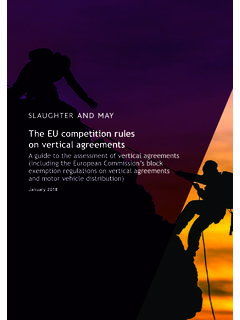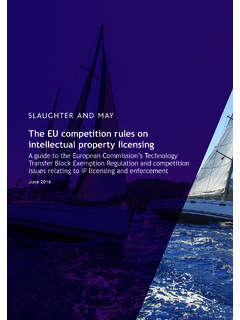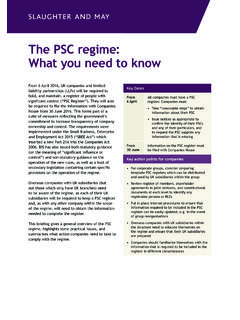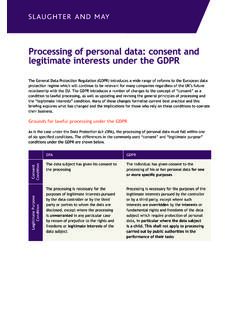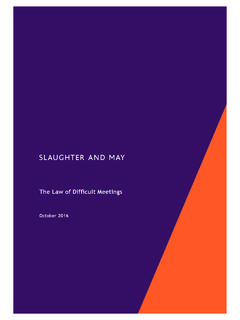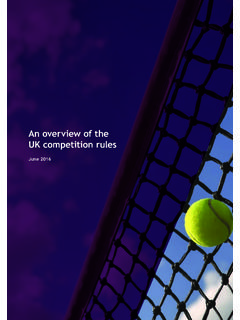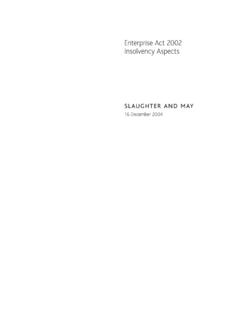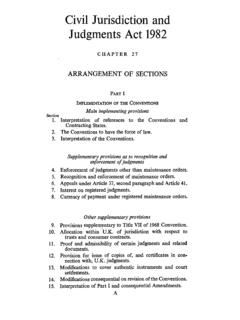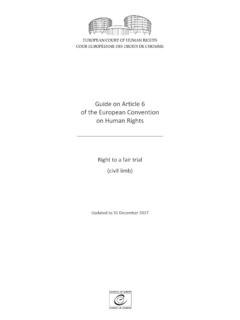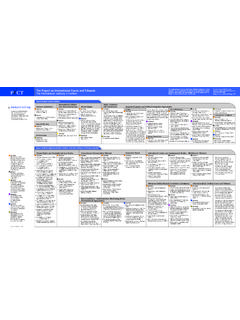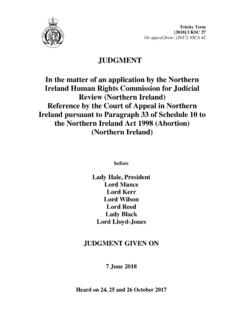Transcription of The dangers of non-compete clauses in sale and …
1 The dangers of non- compete clauses in sale and purchase agreements October 2016. Two recent judgments from the General Court serve as a useful reminder of the potential risks associated with non- compete clauses in sale and purchase , and joint venture, agreements. The General Court's judgments in Portugal Telecom SGPS v Commission and Telef nica SA v Commission (one of which is under appeal) confirm that exceptions in competition law are strictly applied and that getting it wrong can be costly. The ancillary restraints doctrine activity through what is known as the ancillary restraints doctrine . In Europe, the Agreements between competitors not to ancillary restraints doctrine protects from compete with one another are regarded as further scrutiny any restraints that are the most sinister of all competition law (i) directly related to; (ii) objectively infringements.
2 In most jurisdictions merely necessary for; and (iii) proportionate in the entering into an agreement with this purpose context of the implementation of the is sufficient to constitute an infringement - transaction whether it be a merger, regulators are not normally required to prove acquisition or joint venture. that such agreements have had any anti- competitive effect on the market. For a restraint to be directly related to the Furthermore, in an increasing number of transaction, it must be economically related jurisdictions, such conduct is regarded as and intended to allow a smooth transition criminal with the ultimate sanction of from the status quo to the new state of imprisonment for the individuals involved.
3 Affairs. The restraint must also be included in, or at least be closely linked to, the main Against this background, the law recognises agreement . The restraint must also not be that there are valid reasons why a non- the primary purpose for the relationship compete or equivalent clause may be between the parties. This limb is usually necessary in the context of a business easily satisfied. transfer, as vendors could otherwise undermine the transaction by competing with The second necessary limb is not as simple their old business using the know-how and as it at first appears; the test is objective goodwill that they sold to the purchaser.
4 Such that the parties' mere insistence on its necessity is not sufficient. Non- compete Competition regulators have resolved the clauses in M&A agreements are allowed in tension between wanting to take a hard-line order to protect the value of the goodwill on non-competes and wanting to foster M&A. The dangers of non- compete clauses in sale and purchase agreements / October 2016 539462043. and know-how that is being transferred. Any Subject matter proportionality: The restraint that does not serve this purpose is product scope of the restraint cannot not considered to be necessary. The test extend beyond those product markets considers whether the main transaction in which the transferring business is would be practically impossible to implement an active (or intended) competitor.
5 In in the absence of the particular restraint. For 2012 the european Commission example, in Vodafone/BT/Airtel JV the investigated a non- compete clause in european Commission determined that a a JV agreement between Areva SA and restraint preventing Vodafone and BT from Siemens AG. The non- compete clause competing in Spain against the jointly covered not only products and controlled Airtel was not necessary to bring services that the JV was active in but about the envisaged change in the nature of extended to other products (including Vodafone's control of Airtel because Airtel products that the JV merely resold on was already a well-established competitor in behalf of Siemens).
6 The non- compete the Spanish market. obligation was to continue for 11 years following withdrawal from Although the implementation of a the JV. The parties ultimately gave concentration may not be possible without a commitments to the Commission restraint, this does not equate to a carte reducing the scope of the non- blanche to impose any form of non- compete compete to those core products and that the parties desire. The restraint must services of the JV and lessened the also satisfy the third limb of being duration to three years. proportionate to the interest being protected. Geographic proportionality: The product scope of the restraint cannot Proportionality is assessed on the basis of extend beyond those geographic who is bound by the restraint, its subject markets in which the target (or JV.)
7 Matter, geographic scope and duration: company) is an active (or intended). competitor. If the transferring Who is bound: Ancillary restraints are business's current (and anticipated allowed to protect the value of the future) activities are limited to goodwill or know-how purchased in Country X, the restraint can only the sale of a business. Accordingly, reasonably be with respect to the restraint should normally only Country X. apply to the vendor to protect the purchaser's investment or, in the case Temporal proportionality: Finally, if of JVs, only those partners who will the restraint is longer than is have a controlling interest in the JV.
8 Reasonably necessary to protect the A restraint that attempts to bind the interest it will likewise be deemed purchaser or non-controlling JV disproportionate. The underlying partners will, in many cases, be rationale is that the temporal scope disproportionate. should be limited to the point at which the purchaser should have redeemed all the value of the The dangers of non- compete clauses in sale and purchase agreements / October 2016 539462043. know-how and goodwill that it A reminder from the european courts purchased. The european Commission It is fair to say that since the onus of gives some guidance to assist assessing ancillary restraints shifted from companies in assessing the temporal regulators onto the parties themselves, case scope of restraints.
9 Restraints of up to law has been relatively scarce and what three years are likely to be justifiable there is, is not extremely informative as to if both goodwill and know-how are the general principles that can be applied to transferred, and up to two years if future cases. only goodwill is included. Restraints against a JV's controlling parents for The latest addition to the european treatise the lifetime of the JV are likely to be on non- compete clauses is the General justifiable. This is not to say that Court's recent judgments in Portugal longer restraints will never be Telecom SGPS v Commission and Telef nica justified but the onus will fall on the SA v Commission.
10 Portugal Telecom (PT) and companies to justify an extended Telef nica once jointly controlled Vivo period of time. Participacoes, one of the main mobile telecommunications operators in Brazil. In Since 2001 the european Commission will 2010 Telef nica purchased PT's share in Vivo. normally not assess whether a restraint is The sale and purchase agreement contained ancillary or not. This task is left to the self- the following non- compete clause: to the assessment of the parties except where a extent permitted by law, to refrain from case presents novel and unresolved questions participating or investing, directly or giving rise to genuine uncertainty.

